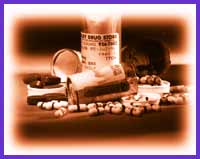Interactions between street drugs and complex new HIV medication regimes are still an unknown risk.
New studies from Toronto Hospital and the University of Liverpool warn that the use of certain street drugs may be severely complicated by new HIV medications.
The problem arises from what’s called the inhibitor and inducer characteristics of the medications. They can play havoc with the metabolizing – and therefore safe dosage – of street drugs.
According to the reports, protease inhibitors such as saquinavir and ritonavir can slow down your metabolizing rate for cocaine, Viagra, speed and Ecstasy to the point that a usual Saturday night dose can suddenly become an overdose.
It is believed the medications cause the party drugs to stay in your system much longer than usual – and they build up to much higher levels.
This would multiply the danger already present in the combination of Viagra with either cocaine or poppers (a Viagra and poppers mix can be fatal).
That’s according to a recent article in the medical journal, Lancet.
The recommendation is to cut out party drugs when you start HIV treatment, and then to begin again with much smaller doses. You will then discover your new tolerance – which may be quite different.
Alternatively, the Toronto study reports that people on methadone treatment (and benzodiazepines) may suffer withdrawal-type symptoms when using ritonavir or indinavir. Prescribed doses of methadone should be closely monitored and on occasion increased, due to accelerated absorption of the methadone.
But bad drug interactions are only a small part of the dangers, according to the Community AIDS Treatment Information Exchange (CATIE).
The chaotic lifestyle that often accompanies illegal drug use makes it difficult to maintain the regularity that is necessary with the new HIV medications. If you are unsure whether your life is stable enough to keep to the difficult regime, you should consider waiting before you start. If scheduled pills are regularly missed, the HIV virus can become resistant to the treatment – eliminating it as a possible life saver in your future.
Many symptoms related to your drug use will also make it difficult to properly diagnose opportunistic infections. Every time you experience nausea or the shakes or a fever, you’ll ask yourself whether it’s a bad drug reaction, a hangover or a serious infection.
Also serious are all the little infections that come with drug and alcohol use. It is imperative for immune-compromised individuals never to share needles or any cooking equipment. Always swab or clean your skin before injecting. Don’t share crack pipes – have your own; you can contract TB or pneumonia. Even passing a joint may now contain a risk that’s not worthwhile.
Prolonged alcohol use (now or in the past) may have weakened your liver and kidneys’ abilities to deal with infections, street drug toxicity or nasty HIV medication side effects. Anything that you can do to build their strength – reducing alcohol consumption, taking vitamin supplements, resting and eating well – can all be important.
Lastly, work with your doctor. This may not always be an easy thing. There is a lot of prejudice (drug users are regularly under-prescribed pain killers for fear that they might overuse them, for example). Try to be as honest as you can with your doctor – it’s in your best interest in the long term.

 Why you can trust Xtra
Why you can trust Xtra


